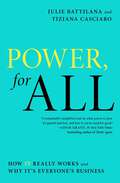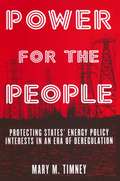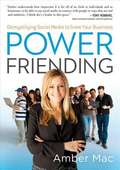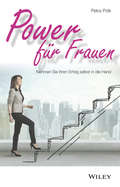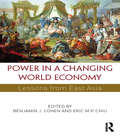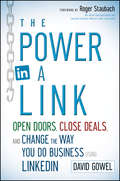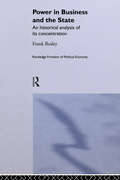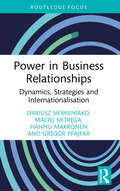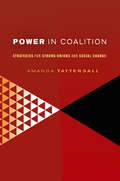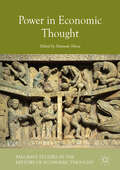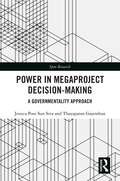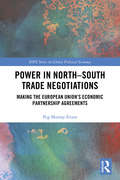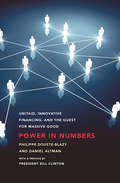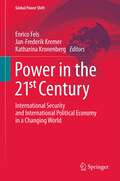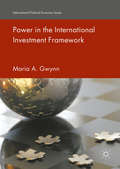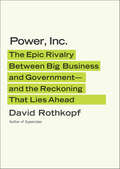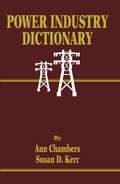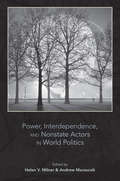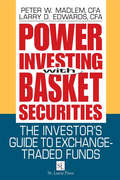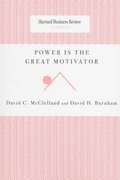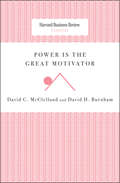- Table View
- List View
Power, for All: How It Really Works and Why It's Everyone's Business
by Julie Battilana Tiziana Casciaro&“A remarkably insightful read on what power is, how it&’s gained and lost, and how it can be used for good. The masterful analysis by two leading experts will make you rethink some of your most basic assumptions about influence&” (Adam Grant, #1 New York Times bestselling author of Think Again).Power is one of the most misunderstood—and therefore vilified—concepts in our society. Most people assume power is predetermined by personality or wealth, or that it&’s gained by strong-arming others. Many write it off as inherently corrupt or &“dirty&” and want nothing to do with it. But as pioneering researchers Julie Battilana and Tiziana Casciaro deftly show in Power, for All, power is the ability to influence someone else&’s behavior. This influence is derived from having access to valued resources, which anyone can have, regardless of their income or status in life. Everyone has a resource to offer, so everyone has access to power. Battilana and Casciaro offer a timely, democratized vision of power. While hierarchies tend to stay in place because power is often sticky, by agitating, innovating, and orchestrating change, they show how those with less power can challenge established structures to make them more balanced. They teach readers how to power-map their workplace to find who can create real change at work, plan for and cause sustaining power shifts, and understand the five motivations for seeking power—money and status, but also autonomy, achievement, affiliation, and morality. They explore how these dynamics play out through vivid storytelling: as Donatella Versace successfully leads her brother&’s company after his death—despite having a title, but little influence; what social movements can learn from youth climate activists and how they can go farther; and how a manager can gain the trust of skeptical employees and improve the workplace. Ultimately, Power, for All demystifies the essential mechanisms for acquiring and using power for all people. Concentrated, accessible, and life-changing, Power, for All is the definitive guide to understanding and navigating power in our relationships, organizations, and society.
Power for the People: Protecting States' Energy Policy Interests in an Era of Deregulation
by Mary M. TimneyPower for the People examines the tension between the social and political interests of states and the market in the case of energy policy. The author has conducted extensive research on California's experience with electricity restructuring, and assesses how the diverging interests of the market vs. the state resulted in that notable failure of energy deregulation. She includes overviews of many other states, and offers analysis on how states can balance their own interests with the market without imposing high costs on their citizens or the environment. This is the first book to look at deregulation from the point of view of the consumer and the states. Exceptionally clear, balanced, and well-written, it is essential reading for anyone interested in public policy, energy studies, and government deregulation of services, and would also be an ideal supplement for any courses in these areas.
Power Friending
by Amber Mac"Amber understands how important it is for all of us, both as individuals and as businesses, to be able to use social media to connect with people in ways that are real and authentic. I think she's a leader in this space. " -Tony Robbins, world-renowned speaker and entrepreneur Amber Mac wants to be your friend. She may be a tech-savvy webpreneur, the popular host of TV shows and video podcasts, and an in-demand consultant and speaker, but if you ask Amber Mac about her strategy for success, she'll tell you she's just trying to be a good friend. When it comes to social media-whether it's Facebook or Twitter or the latest video blog-the tools evolve quickly, the rules change rapidly, and the technology feels more and more complex. But making social media work for your company doesn't have to be complicated or expensive. In this compact yet thorough guide, Mac shows you how to effectively harness the online world to grow your business. The secret: think of your audience as your friends and then treat them that way. The Power Friendingapproach is all about developing real relationships based on mutual respect and support. While you may never meet some of your online friends face-to-face, they still expect you to follow the established norms of friendship: be authentic, reach out, listen. And don't lie to your friends. These same rules apply when building a strong brand online. Whether you're a blogger, a small company, a well-known global enterprise, or an aspiring queen of the Internet, Mac shows how to make the most of social networking tools, including: -Targeting the right networks -Feeding and seeding a community -Authentically engaging with customers and fans -Managing your online friendships on a daily basis and on a budget This isn't a book of abstract theories or complicated strategies. Mac writes from personal experience: she built a huge fan base through social networking. She also draws on real-life and up-to-date examples to give you the information you really need in order to establish and maintain credibility and meaningful relationships online.
Power from Within: A Guide to Success as a Medical Malpractice Defense Expert
by Jeffrey A. Krompier, Esq.There is no end in sight to the frequency with which physicians, nursing professionals and other healthcare providers will become lawsuit targets in our litigious society. While politicians, practitioners, insurance companies and trial attorneys debate the nation’s chronic "malpractice crisis", suits continue to be filed. In addition, once COVID-19 is behind us and the unprecedented public support for health care providers wanes, as it will, it is anticipated that physicians and nurses will become malpractice defendants to a remarkable degree. National legislative fact-finding committees and investigative bodies, which may be charged with the responsibility of pursuing a solution, likely will never achieve a global remedy. Although curtailed by some states, national legislation has not addressed baseless malpractice suites or grossly excessive monetary verdicts. Another approach exists, however. Health care providers can impact the existing system and influence the malpractice environments in a tangible, positive and powerful fashion. Although there will be debate over tort reform in order to bring some degree of protection to the malpractice defendant, individual case success, defined from the defendant’s perspective as a "no-cause" trial verdict, can be realized if well-credentialed and experienced health care professionals are willing to assist the malpractice defense bar as expert witnesses. The benefits to the health care community and the individuals who are willing to participate are innumerable and worth considering.
Power für Frauen: Nehmen Sie Ihren Erfolg selbst in die Hand
by Petra PolkPetra Polk unterstützt Frauen darin, erfolgreicher zu werden. Sie zeigt auf, wie Frauen es schaffen, aus eigenem Antrieb heraus ihren Erfolgsweg zu gehen und richtet sich dabei insbesondere an Frauen im Business und jene auf dem Karriereweg. Petra Polk behandelt in ihrem Buch Themen wie das richtige Mindset, Selbstmarketing, Selbstwertschätzung und Netzwerk-Strategien. Aber auch viele Glaubenssätze, die Frauen am Erfolg hindern, werden betrachtet. Themen wie das Rollenbild werden ebenso angesprochen, wie Neid, Stutenbissigkeit und die permanente Selbstunterschätzung. Die Autorin zeigt jedoch nicht nur auf, wo sich viele Frauen meist selbst im Weg stehen, sondern sie gibt gleichzeitig ganz konkrete Anleitungen, wie sich Frau künftig auf Erfolg ausrichtet. Die Opferrolle - in der sich viele Frauen leider wohlfühlen - funktioniert nicht: Statt falschem Rollendenken und unnötigen Jammerstrategien müssen sich Frauen auf die aktive Gestaltung der persönlichen Erfolgsstrategie konzentrieren. Dabei stellt die Autorin unangenehme Fragen zur Selbstreflexion und sticht mit der imaginären Nadel in jene Stellen, mit denen sich Frauen normalerweise nicht so gerne auseinandersetzen. Als Belohnung erhält die Leserin - neben der Erkenntnis, dass sie letztlich immer nur ganz alleine für ihren Erfolg verantwortlich ist - die erforderlichen Werkzeuge zur Umsetzung.
Power Genes
by Maggie CraddockA New Way of Looking at Power at WorkWho hasn't left the office after a particularly frustrating day wondering what they could have done to turn a negative experience into a positive one? Perhaps it was a difficult conversation with a domineering boss, or an encounter with a know-it-all peer who made you feel insecure. Would you believe the way you react to these interactions likely stems from the dynamics you experienced as a child? Could it be that your childhood persona has grown into your power persona at work?In Power Genes, executive coach Maggie Craddock reveals how to kick those old habits-trying too hard to please, acting out, using manipulative methods of persuasion-and tells how to use power more effectively to advance your career. Craddock identifies four power types and explains how to diagnose yours: The Pleaser-you make others feel good about themselves but need constant validation and approval from them The Charmer-you draw others in with your charm, yet trust is your Achilles heel The Commander-you take charge of the situation and gain admiration from others, but fear any loss of control The Inspirer-you are star power in action, yet your vision for the future can derail the needs of workers right nowThe book outlines a process for avoiding your type's signature destructive reflexes and replacing them with new behaviors-helping you to interact productively with other people in the office. By showing you how to recognize your type's blind spots and then recondition your actions, Power Genes will give you the insights and action plan you need to become a more consistently powerful professional. It's time to throw out unproductive habits and take charge of your workplace relationships.
Power Grab: Political Survival through Extractive Resource Nationalization (Business and Public Policy)
by Paasha MahdaviFor rulers whose territories are blessed with extractive resources -- such as petroleum, metals, and minerals that will power the clean energy transition -- converting natural wealth into fiscal wealth is key. Squandering the opportunity to secure these revenues will guarantee short tenures, while capitalizing on windfalls and managing the resulting wealth will fortify the foundations of enduring rule. This book argues that leaders nationalize extractive resources to extend the duration of their power. By taking control of the means of production and establishing state-owned enterprises, leaders capture revenues that might otherwise flow to private firms, and use this increased capital to secure political support. Using a combination of case studies and cross-national statistical analysis with novel techniques, Mahdavi sketches the contours of a crucial political gamble: nationalize and reap immediate gains while risking future prosperity, or maintain private operations, thereby passing on revenue windfalls but securing long-term fiscal streams.
Power Hungry: The Myths of "Green" Energy and the Real Fuels of the Future
by Robert BryceThe promise of green jobs and a clean energy future has roused the masses. But as Robert Bryce makes clear in this provocative book, that vision needs a major re-vision. We cannot--and will not--quit using carbon-based fuels at any time in the near future for a simple reason: they provide the horsepower that we crave. The hard reality is that oil, coal, and natural gas are here to stay. Fueling our society requires that we make good decisions and smart investments based on facts. In "Power Hungry," Bryce crushes a phalanx of energy myths, showing why renewables are not green, carbon capture and sequestration won't work, and even--surprise --that the U. S. is leading the world in energy efficiency. "Power Hungry" delivers a clear-eyed view of what's needed to transform the gargantuan global energy sector.
Power in a Changing World Economy: Lessons from East Asia
by Benjamin J. Cohen Eric M. P. ChiuThis book is about power in a changing world economy. Though power is ubiquitous in the study of International Political Economy, the concept is underdeveloped in formal theoretical terms. This collection of essays analyses recent experience in East Asia to advance our theoretic understanding of state power in IPE. Over the last quarter century, no other region of the world has had a greater impact on the global distribution of economic resources and capabilities. China, with its "peaceful rise," now stands as the second largest national economy on the face of the earth; South Korea and Taiwan have become industrial powerhouses; Hong Kong and Singapore are among the world’s most important financial centres; and new poles of growth have emerged in several southeast Asian countries – all while Japan, long the region’s dominant market, has slipped into seemingly irreversible decline. The volume’s nine essays, contributed by leading scholars in the United States, Britain and Taiwan, aim to extract relevant inferences and insights from these developments for the study of state power. All are framed by a core agenda encompassing four key clusters of questions concerning the meaning, sources, uses, and limits of power. These essays ask: What new lessons are offered for power analysis in International Political Economy?
The Power in a Link: Open Doors, Close Deals, and Change the Way You Do Business Using LinkedIn
by Dave GowelMake your LinkedIn account work for you and your business LinkedIn is not just another social media tool. It's the world's largest professional online network, with over 120 million users in over two hundred countries. The Power in a Link shows you how to employ this remarkable yet misunderstood resource to execute networking strategies and processes for your business, secure deals, and use (not abuse) your existing relationships. Author David Gowel, the man the Boston Globe has called the "LinkedIn Jedi," delivers the understanding necessary to map networks, stimulate word of mouth, and leverage unparalleled business intelligence to close deals. Arguing that LinkedIn is not social media at all, but instead belongs in a category all of its own, the book cuts through the noise in the crowded social media world with practical applications and explains why all professionals should embrace it in order to achieve success faster through relationships. This book: Advises readers how to spur effective network growth by projecting the right message online Demonstrates how to build and enhance readers' online presence Shows readers how to seek targeted introductions to the connections that matter most Explains why LinkedIn has been misunderstood and therefore misused by many users as well as how to correct past LinkedIn mistakes Partly conceptual, partly autobiographical, and partly technical, The Power in a Link includes success stories from Gowel and other professionals that demonstrate the effectiveness of his techniques.
Power in Business and the State: An Historical Analysis of its Concentration (Routledge Frontiers of Political Economy #Vol. 36)
by Frank BealeyIt is commonplace that political power is becoming more centralized and remote: faceless people, sometimes in unknown places, determine our circumstances and our opportunities. This ground breaking book argues that this happened through a slow development which began before globalization.Power in Business and the State queries our freedom to make our own history. Current circumstances may be so far from our own choosing that our history is now being made for us, rather than something we control ourselves. Political power is so centralized, and economic power so concentrated, that popular control of democratic government has become increasingly difficult.The sheer magnitude of the author's research underpinning this book, and the uncluttered methodological framework in which it is presented, provides a highly readable text.
Power in Business Relationships: Dynamics, Strategies and Internationalisation (Routledge Focus on Business and Management)
by Dariusz Siemieniako Maciej Mitręga Hannu Makkonen Gregor PfajfarFocusing on the issue of power as the main building block of relationships between business buyers and sellers, this book explains the complex nature of power with its multidimensional and multi-directional character. As a complex construct, inter-firm power is treated as a matter of perception as well as in terms of total and relative power. The book analyses extensively the issue of power asymmetry with its dynamics and its consequences for business-to-business (B2B) relationships, particularly analyzing the dynamic mechanism of power. Various theoretical domains or research streams regarding managing an asymmetrical business relationship by the weaker partner are also examined. Based on the studies of other scholars as well as on the authors' own research, this book shows how weaker suppliers or buyers deal with high-power partners in business relationships and the approaches of more powerful parties to asymmetrical relationship development. Additionally, the book presents the specific nature of power in international B2B relationships, including its connection to culture and conflict, as well as how to handle power in managing export performance within international B2B relationships. It is written for scholars and students who are interested in academic research concerning B2B marketing and B2B relationship marketing domains, specifically those who are interested in literature dealing with supply chain management, key account management, relationship portfolio management, distribution channel management and the network approach.
Power in Coalition: Strategies for Strong Unions and Social Change
by Amanda TattersallThe labor movement sees coalitions as a key tool for union revitalization and social change, but there is little analysis of what makes them successful or the factors that make them fail. Amanda Tattersall-an organizer and labor scholar-addresses this gap in the first internationally comparative study of coalitions between unions and community organizations. Tattersall argues that coalition success must be measured by two criteria: whether campaigns produce social change and whether they sustain organizational strength over time. The book contributes new, practical frameworks and insights that will help guide union and community organizers across the globe. The book throws down the gauntlet to industrial relations scholars and labor organizers, making a compelling case for unions to build coalitions that wield "power with" community organizations. Tattersall presents three detailed case studies: the public education coalition in Sydney, the Ontario Health Coalition in Toronto, and the living wage campaign run by the Grassroots Collaborative in Chicago. Together they enable Tattersall to explore when and how coalition unionism is the best and most appropriate strategy for social change, organizational development, and union renewal. Power in Coalition presents clear lessons. She suggests that "less is more," because it is often easier to build stronger coalitions with fewer organizations making decisions and sharing resources. The role of the individual, she finds, is traditionally underestimated, even though a coalition's success depends on a leader's ability to broker relationships between organizations while developing the campaign's strategy. The crafting of goals that combine organizational interest and the public interest and take into account electoral politics are crucial elements of coalition success. For more about Power in Coalition, visit the author's wesbite: http://powerincoalition. com.
Power in Economic Thought (Palgrave Studies in the History of Economic Thought)
by Manuela MoscaThis book offers a pluralistic vision of the way economists have dealt with the question of power in society over the last two centuries. Economists’ ideas about power are examined from political, theoretical and policy-making points of view, with additional discussion of the active participation of economists in the management of power.The book is organized into four main conceptions of power relations: i) Power as embedded in political institutions; ii) Power as emerging from the asymmetric relations caused by the unequal distribution of income and wealth; iii) Power as associated to the monopolistic or oligopolistic position held by some firms in the market; and iv) Power as the management of economic policies by the state.Mosca brings together contributions from a range of scholars to analyse how economists have considered the role of power, putting the discussion into a much needed historical context.
Power in Megaproject Decision-making: A Governmentality Approach (ISSN)
by Thayaparan Gajendran Jessica Pooi SivaThis research-based book critically examines the complex interplay of power relations in decision-making in megaprojects. This book is tailored for academics, students, practitioners, clients, and policymakers and addresses a significant gap in understanding how formal and informal power influences decision-making. Through applying governmentality theory and narrative inquiry from thirty-nine interviews, this book presents over sixty-five detailed stories offering a series of real-life narratives that expose the diverse forms of power at play in megaprojects. The stories reveal how deviations from norms can significantly impact project outcomes. This book uncovers the complex web of power relations, institutional norms, and individual actions driving decisions.This book provides a framework illustrating four behavioural contexts, entrepreneurial, box-ticking, deception, and recklessness, as manifestations of megaproject decision-making, providing readers with a tool to understand and navigate the intricate power dynamics in megaprojects.Readers will benefit from practical insights and strategies for fostering conducive decision-making environments, tailoring interventions to promote constructive behaviours, and mitigating harmful actions. This book is a resource for anyone seeking to grasp the complexities of megaproject management in the context of power relations, shaping their decision-making leading to success.
Power in North-South Trade Negotiations: Making the European Union's Economic Partnership Agreements (RIPE Series in Global Political Economy)
by Peg Murray-EvansAdvancing a constructivist conceptual approach, this book explains the surprising outcome of the Economic Partnership Agreements (EPAs) between the European Union and developing countries in Africa, the Caribbean and the Pacific (the ACP countries). Despite the EU’s huge market power, it had limited success with the EPAs; an outcome that confounds materialist narratives equating trade power with market size. Why was the EU unable to fully realise its prospectus for trade and regulatory liberalisation through the EPA negotiations? Emphasising the role of social legitimacy in asymmetrical North–South trade negotiations, Murray-Evans sets the EPAs within the broader context of an institutionally complex global trade regime and stresses the agency of both weak and strong actors in contesting trade rules and practices across multilateral, regional and bilateral negotiating settings. Empirical chapters approach the EPA process from different institutional angles to explain and map the genesis, design, promotion and ultimately limited impact of the EU’s ambitious prospectus for the EPAs. This volume will be particularly relevant to students and scholars of international trade and development and the EU as an international actor, as well as those researching international political economy, African politics and international trade law.
Power In Numbers: UNITAID, Innovative Financing, and the Quest for Massive Good
by Bill Clinton Philippe Douste-Blazy Daniel AltmanThe story of UNITAID begins with two world leaders but quickly becomes a lesson in popular philanthropy, involving millions of people each making a small contribution to a program aimed at treating and ultimately eliminating the threat of HIV/AIDS, tuberculosis and malaria in the developing world. In partnership with the Clinton HIV/AIDS Initiative (CHAI), UNICEF, and other organizations, UNITAID has pioneered techniques for raising massive amounts of money from a wide pool of donors. UNITAIDOCOs newest program, collecting small contributions via a check-box on the worldOCOs biggest travel websites, launches in the United States in January 2010. It is a fascinating model for philanthropy, proving that you can scale up both the fundraising and the ambition of lifesaving treatment programs. Moreover, UNITAID has proved able to continue its work uninterrupted by the financial turmoil that has blighted other private and government aid programs. It provides a model for challenging times. Launched as a crucial component of UNITAIDOCOs OC MassiveGoodOCO substantial national publicity and promotion campaign, "Power in Numbers" is an inspiring case study for anyone interested in social justice, public health, philanthropy, or fundraising.
Power in the 21st Century: International Security and International Political Economy in a Changing World
by Enrico Fels Jan-Frederik Kremer Katharina KronenbergThe study of power is the nucleus of political science and international relations. As a shift of power from traditional industrial countries to emerging powers has been perceived since the turn of the century, this book aims to present innovative theoretical and empirical approaches that can increase our understanding of this transition. Scholars from the fields of international relations, international political economy, economics and security studies not only explore current theoretical debates on 'power' and 'power shifts' among entities, but also provide fresh insights into relevant aspects of international power in the 21st century. With a particular focus on aspects of international security, trade and production, new methods of identifying power and its sources are presented, and their potential implications and challenges are discussed.
Power in the International Investment Framework
by Maria A. GwynnThis book offers a unique analysis of bilateral investment treaties (BITs). By developing a new, power-focused paradigm for understanding the international investment framework, the author illustrates why there was no paradoxical behaviour when developing countries agreed to the BIT regime, and what has spurred their reaction against it now. She also examines how attempts to regulate investment at a multilateral level have failed, and why the rules of the framework are evolving. Inspired by the work of Susan Strange, Gwynn fills a significant lacuna in our understanding of these issues by demonstrating how power determines the actions of all those involved. This holistic reinterpretation of international investment focuses in particular on Latin America, but has wider implications for the negotiation of new treaties, including such controversial provisions as the Transatlantic Trade and Investment Partnership. It will appeal to lawyers, economists, political scientists and scholars of Latin America.
Power, Inc.: The Epic Rivalry Between Big Business and Government—and the Reckoning That Lies Ahead
by David RothkopfThe world's largest company, Wal-Mart Stores, has revenues higher than the GDP of all but twenty-five of the world's countries. Its employees outnumber the populations of almost a hundred nations. The world's largest asset manager, a secretive New York company called Black Rock, controls assets greater than the national reserves of any country on the planet. A private philanthropy, the Bill and Melinda Gates Foundation, spends as much worldwide on health care as the World Health Organization. The rise of private power may be the most important and least understood trend of our time. David Rothkopf provides a fresh, timely look at how we have reached a point where thousands of companies have greater power than all but a handful of states. Beginning with the story of an inquisitive Swedish goat wandering off from his master and inadvertently triggering the birth of the oldest company still in existence, Power, Inc. follows the rise and fall of kings and empires, the making of great fortunes, and the chaos of bloody revolutions. A fast-paced tale in which champions of liberty are revealed to be paid pamphleteers of moneyed interests and greedy scoundrels trigger changes that lift billions from deprivation, Power, Inc. traces the bruising jockeying for influence right up to today's financial crises, growing inequality, broken international system, and battles over the proper role of government and markets.Rothkopf argues that these recent developments, coupled with the rise of powers like China and India, may not lead to the triumph of American capitalism that was celebrated just a few years ago. Instead, he considers an unexpected scenario, a contest among competing capitalisms offering different visions for how the world should work, a global ideological struggle in which European and Asian models may have advantages. An important look at the power struggle that is defining our times, Power, Inc. also offers critical insights into how to navigate the tumultuous years ahead.
Power Industry Dictionary
by Ann Chambers Susan KerrThis quick reference offers a broad spectrum of nearly 4,000 industry terms and phrases. Terms used in generation, transmission, and distribution can be found here, along with common business and billing language and terms related to the major governmental and industry regulations. Environmental terms and phrases relevant to the electric power industry are also included. As a convenience, additional reference material is located in the back of this volume, including an assortment of conversion tables, a table of the chemical elements and their associated symbols and weights, and a contact list of prominent industry organizations.
Power, Interdependence, and Nonstate Actors in World Politics
by Helen V. Milner Andrew MoravcsikSince they were pioneered in the 1970s by Robert Keohane and others, the broad range of neoliberal institutionalist theories of international relations have grown in importance. In an increasingly globalized world, the realist and neorealist focus on states, military power, conflict, and anarchy has more and more given way to a recognition of the importance of nonstate actors, nonmilitary forms of power, interdependence, international institutions, and cooperation. Drawing together a group of leading international relations theorists, this book explores the frontiers of new research on the role of such forces in world politics. The topics explored in these chapters include the uneven role of peacekeepers in civil wars, the success of human rights treaties in promoting women's rights, the disproportionate power of developing countries in international environmental policy negotiations, and the prospects for Asian regional cooperation. While all of the chapters demonstrate the empirical and theoretical vitality of liberal and institutionalist theories, they also highlight weaknesses that should drive future research and influence the reform of foreign policy and international organizations. In addition to the editors, the contributors are Vinod Aggarawal, Jonathan Aronson, Elizabeth DeSombre, Page Fortna, Michael Gilligan, Lisa Martin, Timothy McKeown, Ronald Mitchell, Layna Mosley, Beth Simmons, Randall Stone, and Ann Tickner.
Power Investing With Basket Securities: The Investor's Guide to Exchange-Traded Funds
by Peter W. Madlem Larry D. EdwardsTremendously versatile, basket securities have the potential to change the way money is managed. This book provides the proper definition of the basket security, a brief exploration of their true history, and powerful ways to exploit their advantages. The authors explore simple yet effective ways basket securities can be used in asset management strategies including trading the market, building a diversified core, or creating a thousand stock portfolio. They cover the broad array of currently available basket securities and discuss others that are on the horizon, what and when to buy and sell, and how to protect investments from market declines.
Power is the Great Motivator (Harvard Business Review Classics)
by David C. Mcclelland David H. BurnhamIn this exploration into the nature and value of power in organizations, the authors reveal how the drive for influence is essential to good management. They provide a wealth of counterintuitive insights about what using power really means to foster high morale and a strong sense of responsibility in the workplace.
